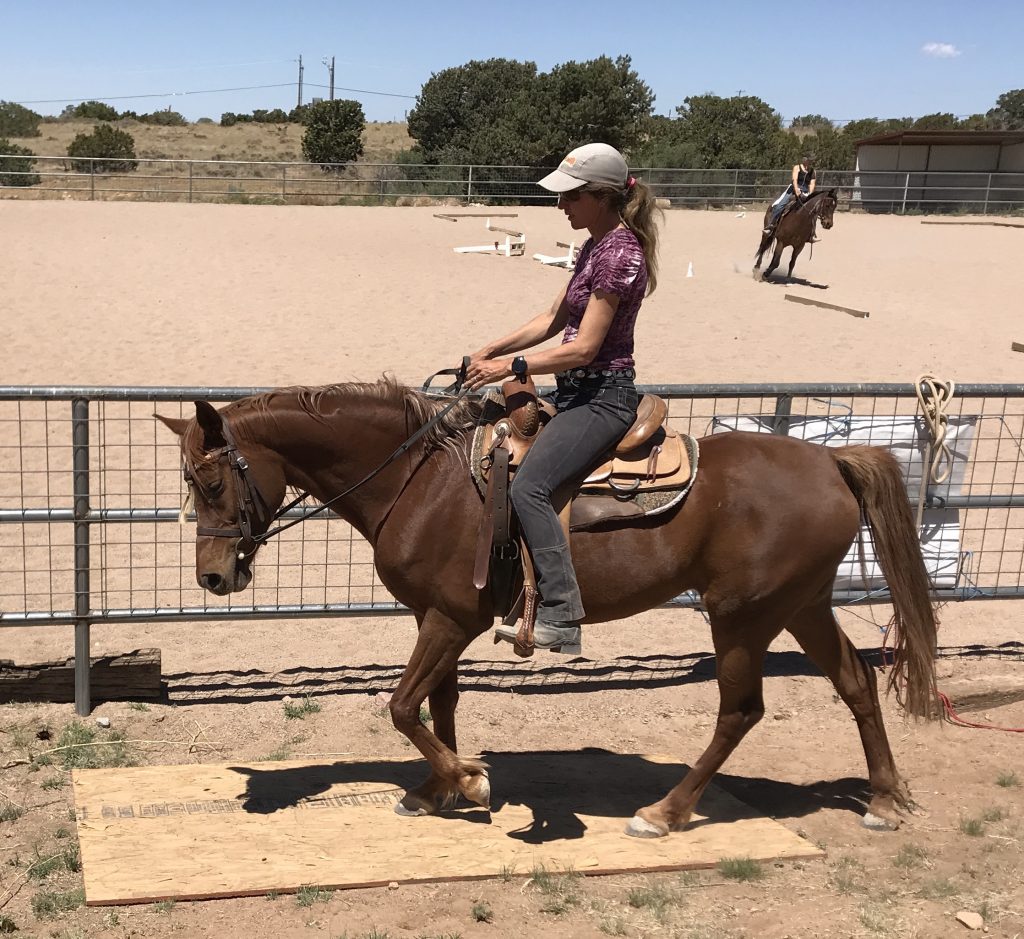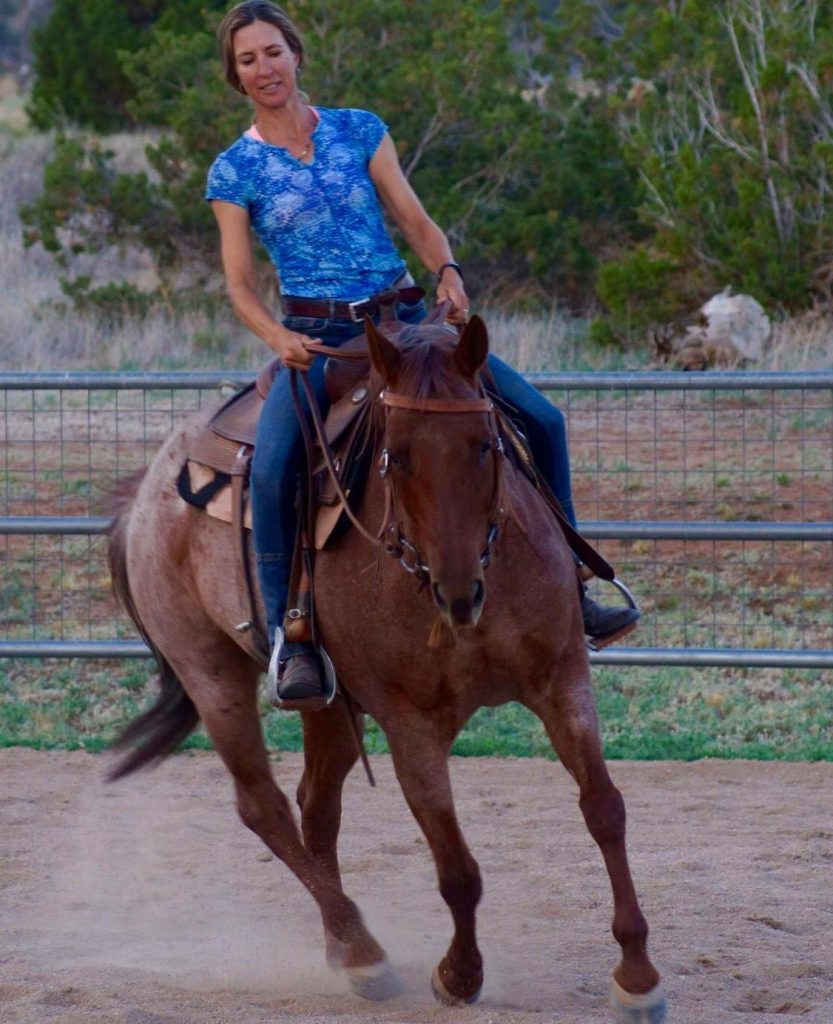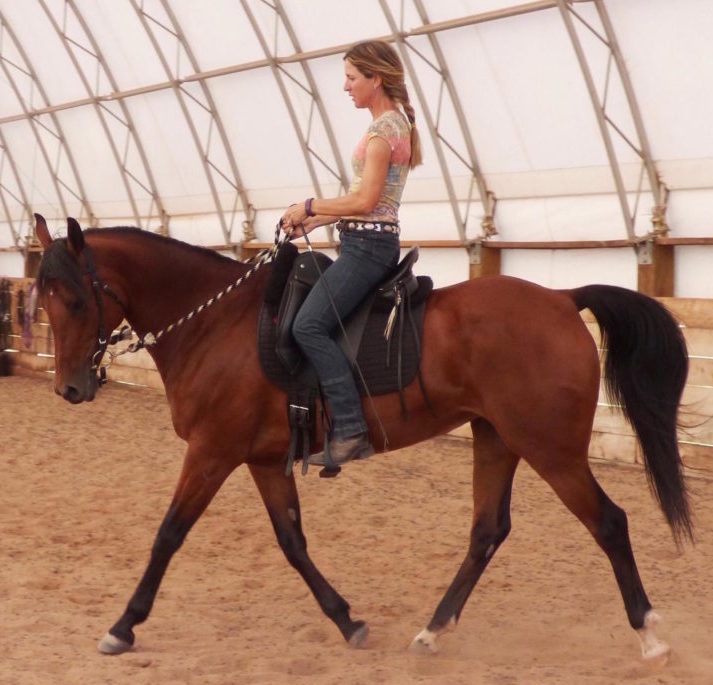 Editor’s Note: 2018 & 2019 Best Horse Practices Summit presenter Katrin Silva grew up riding dressage in Germany before moving to the United States at age 19 to learn to ride Western. She’s been riding both disciplines for the last twenty years and is a regular guest columnist for Cayuse Communications, with a new book “Dressage for the Rest of Us.” She lives in New Mexico where she works with dressage and Western clients. Visit her blog here.
Editor’s Note: 2018 & 2019 Best Horse Practices Summit presenter Katrin Silva grew up riding dressage in Germany before moving to the United States at age 19 to learn to ride Western. She’s been riding both disciplines for the last twenty years and is a regular guest columnist for Cayuse Communications, with a new book “Dressage for the Rest of Us.” She lives in New Mexico where she works with dressage and Western clients. Visit her blog here.
Silva writes:
I spend most of my time riding horses, six days a week, working with eight to ten horses. That means I spend most of my time on a horse, or with a horse, one on one.
People ask: “Don’t you get bored?”
Every time, my answer is, “No.”
I may feel bone tired, discouraged when a horse doesn’t seem to make much progress or because I don’t think I know enough. I may be cold in the winter, hot in the summer, covered in dirt any time of the year. But bored? Never.
 For me, working with a horse means being with that horse all the way, on every level of my being. Physically, mentally, emotionally. I find it’s a mutual kind of mindfulness: I open myself to what the horse has to say and respond to what the horse tells me. I do it with kindness and understanding, instead of pushing my own agenda.
For me, working with a horse means being with that horse all the way, on every level of my being. Physically, mentally, emotionally. I find it’s a mutual kind of mindfulness: I open myself to what the horse has to say and respond to what the horse tells me. I do it with kindness and understanding, instead of pushing my own agenda.
I like to picture a bubble around us, a transparent boundary that creates space for the two of us. There is no room for anyone else. We talk to each other – his back to my back, his mouth to my hands, his sides to my legs. I answer with my seat, with my reins, with my voice. It’s an ongoing conversation that flows both ways.
Sometimes, we argue. Sometimes, we make small talk. Sometimes, we have deep and meaningful discussions. Sometimes, we joke around. Sometimes we tell each other how much we love each other. Other times, not so much. Sometimes, we’re silent, but still aware of each other’s presence.
Neither of us is alone. Neither of us is bored.
The phrase I use in conversations with my horses is also a mantra for my work: You’re with me.
 This means: You, horse, don’t have to worry about the plastic bag blowing across the arena or the orange tractor driving by. You’re with me. You’re safe. You’re going to be okay, in spite of everything that’s going on around you. Nothing bad will happen to you as long as you’re with me.
This means: You, horse, don’t have to worry about the plastic bag blowing across the arena or the orange tractor driving by. You’re with me. You’re safe. You’re going to be okay, in spite of everything that’s going on around you. Nothing bad will happen to you as long as you’re with me.
You’re with me also means you are listening to what I say, so you don’t have time to focus on other horses, or noisy weed whackers. I will ask you for things you may find challenging, but I won’t overwhelm you. I will back off when you get anxious. I won’t punish you for trying a range of responses to what I’m asking. You’re with me. Your body and mind are occupied. You don’t need to look elsewhere.
On yet another level, You’re with me implies its opposite: I’m with you. It means I will give you, horse, my full attention. My body moves with yours. My mind connects to your mind. I will be with you, reassure you, be there for you. You can count on me. I won’t let you down.
Being with a horse in this way takes up all my headspace. Being with a horse pushes aside all the unproductive, often negative chatter that goes on in my brain. When I ride, I

Katrin Silva
stop fretting about all the unchecked items on my to-do list. I stop worrying about the next show, about what I forgot to pick up at the grocery store, about when my car is due for an oil change. I stop beating myself up over how I handled a difficult conversation with a client, or about the time I rode off pattern in a dressage test even though I had a caller. I stop ruminating. I stop analyzing. Instead, I get to spend a lot of time in the flow state. When I work with horses, I don’t think of checking my email or Facebook feed. I don’t wonder who has texted me since the morning. I don’t know where my phone is when I’m with a horse.
Of course, this does not mean I’ve forgotten how to worry or fret. I’m still good at these things. But working with horses means I spend less time engaged in mental self-flagellation, and more time in the present. And, as mindfulness teachers keep pointing out, spending more time in the present is the key to becoming a calmer, kinder, healthier, less stressed-out, more considerate human being.
I’ve tried meditation. Sometimes, I can focus on my breath for a full minute. Sometimes, I manage to sit quietly for a full three minutes before fidgeting. But I can ride for eight or more hours a day without a problem. Horses remind me to stay in the here-and-now more effectively than any more formal mindfulness practice. On the long list of reasons horses are good for us, this one has to rank near the top: they make us better people.
LOVE this Katrin!!!!